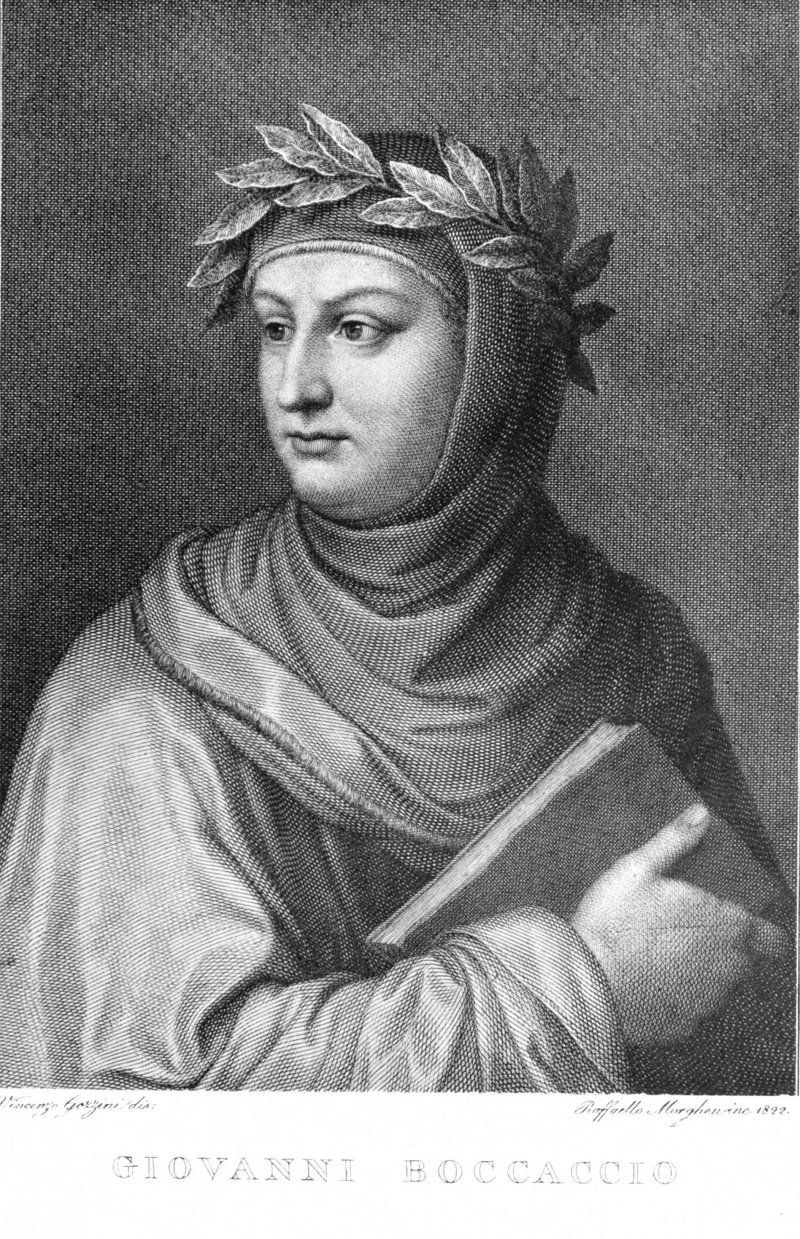“Vale más actuar exponiéndose a arrepentirse de ello, que arrepentirse de no haber hecho nada.”
Fuente: Palomo Triguero, Eduardo. Cita-logía. Editorial Punto Rojo Libros,S.L. ISBN 978-84-16068-10-4. p. 23.
Giovanni Boccaccio fue un escritor y humanista italiano. Es uno de los padres, junto con Dante y Petrarca, de la literatura en italiano. Compuso también varias obras en latín. Es recordado sobre todo como autor del Decamerón.

“Vale más actuar exponiéndose a arrepentirse de ello, que arrepentirse de no haber hecho nada.”
Fuente: Palomo Triguero, Eduardo. Cita-logía. Editorial Punto Rojo Libros,S.L. ISBN 978-84-16068-10-4. p. 23.
“Los lazos de la amistad son más estrechos que los de la sangre y la familia.”
Fuente: Carballal Doob, Teresa; Carballal, Teresa; Groeger Ribas, Margarita. Charlas de Sobremesa: conversación en español. Edición ilustrada. Editoial Yale University Press, 2015. ISBN 9780300191622. p. 89. https://books.google.es/books?id=zGLdCgAAQBAJ&pg=PA89&dq=Los+lazos+de+la+amistad+son+m%C3%A1s+estrechos+que+los+de+la+sangre+y+la+familia.+Boccaccio&hl=es&sa=X&ved=0ahUKEwi8-u7m2KLgAhUQy4UKHXeeDlYQ6AEIMTAC#v=onepage&q=Los%20lazos%20de%20la%20amistad%20son%20m%C3%A1s%20estrechos%20que%20los%20de%20la%20sangre%20y%20la%20familia.%20Boccaccio&f=false
“Boca besada no pierde fortuna, que se renueva como la luna.”
Fuente: Decamerón. Giovanni Boccaccio. Editor Giovanni Boccaccio, 2016. ISBN 9786050435740. Final “Novela séptima”. https://books.google.es/books?id=TeskDAAAQBAJ&pg=PP134&dq=Boca+besada+no+pierde+fortuna,+es+m%C3%A1s+renueva+como+la+luna.+Boccaccio&hl=es&sa=X&ved=0ahUKEwiigaXu16LgAhXm1-AKHYgJBj4Q6AEILTAB#v=onepage&q=Boca%20besada%20no%20pierde%20fortuna%2C%20es%20m%C3%A1s%20renueva%20como%20la%20luna.%20Boccaccio&f=false
Fuente: Amate Pou, Jordi. Paseando por una parte de la Historia: Antología de citas. Editorial Penguin Random House Grupo Editorial España, 2017. ISBN 9788417321871. p. 48.
“Haz lo que decimos y no hagas lo que hacemos.”
Fuente: Palomo Triguero, Eduardo. Cita-logía. Editorial Punto Rojo Libros,S.L. ISBN 978-84-16068-10-4. p. 86.
Fuente: Boccaccio, Giovanni. Decamerón. Tomo I. Club Internacional del Libro ISBN 978-84-407-1848-8. Prólogo.
“Dying more like animals than human beings.”
Non come uomini, ma quasi come bestie, morieno.
First Day, Introduction
The Decameron (c. 1350)
Le forze della penna sono troppo maggiori che coloro non estimano che quelle con conoscimento provato non hanno.
Eighth Day, Seventh Story
The Decameron (c. 1350)
Leggiadre donne, infra molte bianche colombe aggiugne più di bellezza uno nero corvo, che non farebbe un candido cigno.
Ninth Day, Tenth Story
The Decameron (c. 1350)
Fate quello che noi diciamo e non quello che noi facciamo.
Third Day, Seventh Story
The Decameron (c. 1350)
Chi mal ti vuol, mal ti sogna.
Ninth Day, Seventh Story (tr. J. M. Rigg)
The Decameron (c. 1350)
Uno amore...a lieto fin pervenuto, in una novelletta assai piccola intendo di raccontarvi.
Fifth Day, Fourth Story
The Decameron (c. 1350)
“A sin that's hidden is half forgiven.”
Peccato celato e mezzo perdonato.
First Day, Introduction
J. M. Rigg's translation http://decameron.obdurodon.org/engdecameronviewreading.html: Sin that is hidden is half forgiven.
The Decameron (c. 1350)
“People are more inclined to believe in bad intentions than in good ones.”
La gente è più acconcia a credere il male che il bene.
Third Day, Sixth Story
The Decameron (c. 1350)
Essere la natura de' motti cotale, che essi come la pecora morde deono cosi mordere l'uditore, e non come 'l cane: percio che, se come cane mordesse il motto, non sarebbe motto, ma villania.
Sixth Day, Third Story
The Decameron (c. 1350)
“And if his own joy knew no bounds, the girl was no less delighted on seeing him.”
Se egli fu lieto assai, la letizia della giovane non fu minore.
Fifth Day, Third Story
The Decameron (c. 1350)
“They banish us to the kitchen, there to tell stories to the cat.”
Ci cacciano in cucina a dir delle favole colla gatta.
Fifth Day, Tenth Story (tr. J. M. Rigg)
The Decameron (c. 1350)
“A kissed mouth doesn't lose its freshness, for like the moon it always renews itself.”
Bocca baciata non perde ventura, anzi rinnuova come fa la luna.
Second Day, Seventh Story
The Decameron (c. 1350)
Sempre non può l' uomo un cibo, ma talvolta desidera di variare.
Seventh Day, Sixth Story
The Decameron (c. 1350)
“The deceived has the better of the deceiver.”
Lo ingannatore rimane a pié dello ingannato.
Second Day, Ninth Story (tr. J. M. Rigg)
The Decameron (c. 1350)
“An oak is not felled by a single blow of the axe.”
Per lo primo colpo non cade la quercia.
Seventh Day, Ninth Story (tr. J. M. Rigg)
The Decameron (c. 1350)
“While superfluity engenders disgust, appetite is but whetted when fruit is forbidden.”
Come la copia delle cose genera fastidio, cosl l'esser le desiderate negate moltiplica l'appetito.
Fourth Day, Third Story (tr. J. M. Rigg)
The Decameron (c. 1350)
“In the affairs of this world, poverty alone is without envy.”
Sola la miseria è senza invidia nelle cose presenti.
Fourth Day, Introduction
The Decameron (c. 1350)
“Wrongs committed in the distant past are far easier to condemn than to rectify.”
Le cose mal fatte e di gran tempo passate son più agevoli a riprendere che ad emendare.
Second Day, Fifth Story
The Decameron (c. 1350)
Se medesimi esaltando con parole da fare per istomacaggine le pietre saltar del muro e fuggirsi.
Il Corbaccio (c. 1355), "The Labyrinth of Love" (tr. Normand Cartier)
“A just king must be the first to observe those laws that he has himself prescribed.”
Ogni giusto re primo servatore dee essere delle leggi fatte da lui.
Seventh Day, Tenth Story
The Decameron (c. 1350)
“A sweet little mouth with lips like rubies.”
Una boccuccia piccolina, le cui labbra parevan due rubinetti.
Fourth Day, Conclusion
The Decameron (c. 1350)
“Shortly afterwards the moon rose with a very clear sky, and [he] kept watch.”
E poco appresso levatasi la luna, e 'l tempo essendo chiarissimo, [egli] vegghiava.
Fifth Day, Third Story (tr. J. M. Rigg)
The Decameron (c. 1350)
Natural ragione è di ciascuno che ci nasce, la sua vita, quanto può, aiutare e conservare e difendere.
First Day, Introduction
The Decameron (c. 1350)
“He who is wicked and held to be good, can cheat because no one imagines he would.”
Chi è reo e buono è tenuto
Può fare il male e non è creduto.
Fourth Day, Second Story
The Decameron (c. 1350)